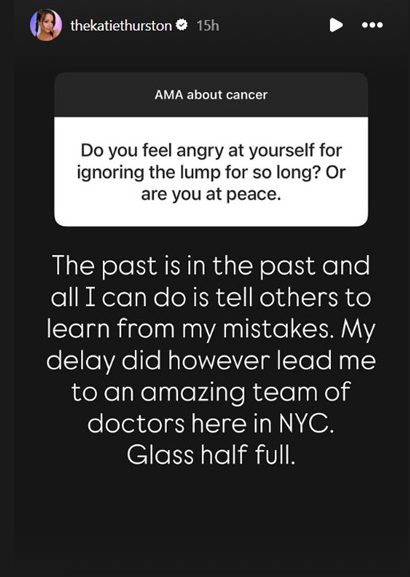Managing Anxiety While Awaiting Cancer Test Results
- The Bachelorette alum Katie Thurston, 34, shared uplifting news that her tumors are shrinking, signaling that her current treatment plan for stage 4 breast cancer is working.
- Thurston was diagnosed with metastatic breast cancer after delaying treatment to pursue IVF with her husband and explore a clinical trial—efforts aimed at preserving fertility and accessing cutting-edge care. She was ultimately ineligible for the trial due to the advanced stage of her cancer.
- Stage 4, or metastatic, breast cancer occurs when cancer spreads beyond the breast to other parts of the body. While it is not curable, many treatment options are available to help manage the disease and extend quality of life.
- “Scanxiety”—the stress and worry surrounding cancer scans—is common among patients. Psychiatrist Dr. Samantha Boardman recommends coping strategies like exercise, creative hobbies, music, or any activity that fosters a sense of “flow” and helps shift focus away from the uncertainty.
After a recent visit to her doctor, Thurston received confirmation that her current treatment plan is working. She took to Instagram to share the encouraging news with her followers.
Read More
Understanding Thurston’s Diagnosis
Thurston’s cancer is classified as hormone receptor-positive (HR+) and HER2-negative (HER2-), the most common subtype of breast cancer. According to Penn Medicine, about 70% of new breast cancer cases each year fall into this category.Hormone receptors are proteins found on breast cells that respond to estrogen or progesterone. When cancer cells have these receptors, they can grow in response to these hormones—making them hormone receptor-positive. HER2, on the other hand, is a protein that can accelerate cancer cell growth. Tumors are labeled HER2-positive when they overexpress this protein, and HER2-negative when they don’t.

Traditionally, HER2 status has been viewed in binary terms—positive or negative—though many patients fall somewhere in between. These classifications are determined by how the tumor appears under a microscope and through additional testing by a pathologist.
Inside Katie’s Treatment Plan
Thurston’s current regimen includes three key medications:
- Kisqali (ribociclib): Approved by the FDA in 2017, this targeted therapy is used in combination with endocrine therapy to treat HR+/HER2- breast cancer. It works by slowing the progression of cancer, offering a more tolerable alternative to traditional chemotherapy.
- Lupron (leuprolide): A hormone therapy injection that lowers estrogen levels in the body, helping to prevent the cancer from growing.
- Letrozole: An aromatase inhibitor that reduces the body’s estrogen production, commonly used in postmenopausal women with hormone-sensitive breast cancer.
Katie’s Message of Hope and Advocacy
Thurston also used her platform to raise awareness about the realities of living with metastatic breast cancer and the importance of continued research.
“This is amazing news, and I am so relieved! People don’t realize, as it stands now, I’ll be on a treatment plan for life. There isn’t a cure for [STAGE 4] breast cancer. But as long as funding for medical research continues, especially for #metavivors, then we have a chance at continuing a long, healthy life.”
View this post on Instagram
Her message is a reminder of both the progress made in cancer treatment and the ongoing need for support and innovation in medical research.
Expert Resources for Metastatic Breast Cancer
- Advances in Metastatic Breast Cancer Treatments Over the Last Year Offer New Hope for Those Fighting
- Are You A Metastatic Breast Cancer Patient Curious About The Drug Enhertu? Here’s What You Need To Know
- Do You Have HER2-Positive Metastatic Breast Cancer? Here’s A Breakdown Of Some Of Your Treatment Options
- Metastatic Breast Cancer Sees Advancements in ‘New Era’ of HER2 Classification; Understanding HER2 Breast Cancer
- Metastatic Breast Cancer: Biomarkers and Mutations That Matter
- Metastatic Breast Cancer: You Are Not a Statistic
Katie Thurston Reflects on Delayed Treatment and Lessons Learned in Her Cancer Journey
Katie Thurston, former star of The Bachelorette, recently opened up to her followers in a candid Instagram Q&A, offering a deeply personal look into her breast cancer journey. Through a series of Instagram Stories, Thurston shared her reflections, regrets, and the decisions that shaped her path since being diagnosed with metastatic breast cancer.

A Delayed Diagnosis
Thurston revealed that she initially ignored a lump she discovered nearly a year before her official diagnosis—something she now regrets.
“I was diagnosed almost five months ago with #breastcancer. But if I’m being honest, I found the lump maybe 12 months ago. I was 33 years old with no family history. Why would I ever suspect #cancer — but it was,” she shared.
When asked by a follower if she felt angry about waiting so long to seek medical attention, Thurston responded with grace and perspective:
“The past is in the past, and all I can do is tell others to learn from my mistakes. My delay did, however, lead me to an amazing team of doctors here in NYC. Glass half full.”
View this post on Instagram
Thurston explained that her decision to delay treatment wasn’t made lightly. She postponed care to transfer her medical team, pursue fertility preservation, and explore participation in a clinical trial.
“I delayed treatment to transfer my care to @columbia. I delayed treatment to pursue IVF — I delayed treatment because I attempted to join a clinical trial, only to be denied after discovering I had #metastaticbreastcancer, meaning stage IV, for life,” she said.
In a previous Instagram post, Thurston and fellow Bachelor alum Jeff Acuri shared a clip of themselves consulting with a doctor about IVF. She elaborated on that experience:
“At the time of my diagnosis, I thought I was stage 3 and would eventually start chemotherapy. Because of this, we did one round of IVF… and successfully froze two embryos.”
The Clinical Trial Hurdle
Thurston also opened up about being denied entry into a clinical trial—an emotional setback for many patients seeking cutting-edge treatment options. Clinical trials are essential for advancing cancer research and can offer access to therapies not yet approved by the FDA. However, they also come with strict eligibility requirements and potential risks.
WATCH: Understanding Clinical Trials
While Thurston was ultimately ineligible due to her stage 4 diagnosis, she continues to advocate for awareness and education around clinical trials:
“I attempted to join a clinical trial, only to be denied after discovering I had #metastaticbreastcancer.”
Despite the challenges, Thurston’s reflections are filled with resilience and a desire to help others learn from her experience. Her openness underscores the importance of early detection, informed decision-making, and the emotional complexity of navigating a life-altering diagnosis.
Coping with “Scanxiety”: How Katie Thurston and Experts Tackle the Stress of Cancer Scans
Before Katie Thurston received the hopeful news that her breast cancer tumors were shrinking, she faced a wave of anxiety familiar to many cancer patients—what’s often called “scanxiety.”
Scanxiety refers to the intense stress and worry that builds up before receiving scan results. It’s a common emotional hurdle for those undergoing cancer treatment.
“Scan anxiety is unbelievably stressful,” said Dr. Samantha Boardman, assistant professor of psychiatry at Weill Cornell Medicine, in an interview with SurvivorNet.
Finding Calm Through ‘Flow’
Dr. Boardman suggests that one of the most effective ways to manage scanxiety is to tap into a psychological state known as “flow”—a mental zone where time seems to disappear because you’re fully immersed in an activity.
“Probably one of the best antidotes that I think psychology can offer patients is to experience flow,” she explained.
To reach that state, she recommends engaging in activities that absorb your attention and bring you joy—like exercising, creating art, listening to music, or diving into a favorite hobby.
“How can we experience flow in our daily lives? It’s usually in some form of a hobby, something we just do because we love doing it,” Dr. Boardman said. “I really encourage patients to find and experience something that they can do that gives them flow. It might be baking, it might be gardening, it might even be doing some housework. They are so immersed in that experience that they’re not thinking about anything else.”
A Simple Exercise to Reclaim Control
Another practical tool Dr. Boardman offers is a four-column journaling exercise. On a piece of paper, she advises patients to draw four columns labeled:
- What I don’t know
- What I do know
- What I can’t control
- What I can control
“I’ll ask patients to write down what I don’t know, what I do know, what I can’t control, and what I can control,” she said. From there, “a helpful way to dial down their anxiety” involves “trying to move as many items as possible into what they know and can control.”
This visual mapping technique helps patients externalize their worries and focus on what they can influence, offering a sense of empowerment during uncertain times.
Whether it’s through creative expression, physical activity, or mindful journaling, Thurston’s experience—and Dr. Boardman’s advice—remind us that while we can’t always control the outcome, we can take steps to ease the emotional toll of waiting.
Treatment Options for Advanced Breast Cancer
Metastatic breast cancer (also called stage 4) means cancer cells have spread from the breast to other parts of the body, which may include the bones, liver, lungs, brain, and beyond.
Breast cancer spreads through the bloodstream or lymphatic system. The blood carries cancer cells to different body parts, where they grow as new tumors.
As the cancer spreads to other body parts, patients may experience additional symptoms depending on where the cancer has spread. Examples include:
- Bones: Severe bone pain or fractures
- Lungs: Difficulty breathing, chest pain, new cough
- Liver: Yellowing of the skin (jaundice), abdominal pain, nausea, and/or vomiting
- Brain: Headaches, memory loss, changes in vision, seizures
WATCH: Treatment options for metastatic breast cancer.
Although stage 4 breast cancer is not curable, several treatment options exist that can extend the life of patients. Treatment options depend on the stage, type of primary breast cancer, and whether hormone receptors are positive.
Treatment can include a combination of:
- Chemotherapy: Oral or IV medications that are toxic to tumor cells
- Hormonal therapies: Drugs that lower estrogen levels or block estrogen receptors from allowing the cancer cells to grow
- Targeted therapies: Drugs that target your tumor’s specific gene mutations
- Immunotherapy: Medications that stimulate your immune system to recognize and attack cancer cells
- Radiation: The use of high-energy rays to kill tumor cells and shrink tumors
- Surgery: To remove a cancerous tumor or lymph nodes (uncommon with stage IV; more common in stages I, II, and III)
- Clinical trials: Studies of new medications, treatments, and other therapies offer hope for better outcomes
Questions for Your Doctor
If your breast cancer journey involves metastasis, you may be wondering what to expect and if radiation therapy is an option for you. Here are some questions you can ask your doctor to get the conversation started:
- What type of breast cancer do I have? Does it have a risk of spreading?
- Does my breast cancer have a risk of spreading to my brain?
- Will radiation help treat the cancer in my brain? What type of radiotherapy do you recommend?
- How long does radiation treatment typically last?
- Will I have to take time away from work and daily activities?
- Would I be on any other forms of treatment while receiving radiation?
- How do you expect my cancer to respond to the treatment?
- What financial resources are available to me to help cover costs associated with radiation treatment?
- What’s the efficacy of radiation treatment?
Learn more about SurvivorNet's rigorous medical review process.

